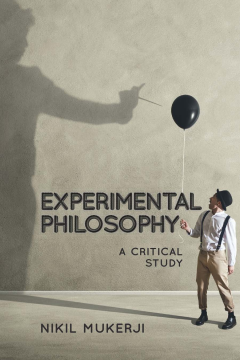
Additional Information
Book Details
Abstract
Over the past one and a half decades, the scope of experimental philosophy (x-phi) has expanded significantly. Experimental research programmes now cover almost all areas of philosophy, including epistemology, the philosophy of language, action theory, and the free will debate, to name just a few. This volume introduces the reader to these new developments in an accessible and systematic way. It explains how x-phi differs from traditional views of philosophy, investigates in depth how it uses empirical evidence to support philosophical conclusions of various kinds, and introduces the reader to both the most widely discussed experimental studies and the latest advancements in the field. As a critical study, it also examines the various criticisms that x-phi has received over the years and seeks, tentatively, to adjudicate them.
In this new introduction to experimental philosophy, Nikil Mukerji locates the field in relation to traditional philosophy, and he does this via a favorite tool of traditional philosophy – distinctions. Mukerji distinguishes several different programs within experimental philosophy, and he shows how the different programs bear on traditional philosophical debates and methods. The book is a manifestly illuminating introduction to the field, which also serves admirably to sharpen debates for researchers working in the field.
Shaun Nichols, Sherwin Scott Professor of Philosophy, University of Arizona
This is a very valuable introduction into experimental philosophy which clarifies both the scope and the limits of this highly relevant field. The book deserves to be widely read.
Christoph Lütge, Professor and Chair of Business Ethics, Technical University of Munich
Nikil Mukerji is a postdoctoral researcher at the Faculty of Philosophy, Philosophy of Science, and the Study of Religion at Ludwig-Maximilians-Universita¨t Mu¨nchen (Munich, Germany) and academic director of the executive master’s degree programme Philosophie Politik Wirtschaft (PPW) also at LMU. He studied business administration, economics, philosophy, logic and scientific theory in Munich (Germany), Aberdeen (UK) and Auckland (NZ). His research and teaching interests comprise practical philosophy and particularly ethics, the philosophy of science (esp. economics), practical logic and argumentation theory as well as experimental philosophy.
Fifteen years ago, experimental philosophy shook the foundations of philosophy: century-old methods were challenged; revolutionary ideas were discussed; and a new future for philosophy was sketched. In his outstanding book, Experimental Philosophy: A Critical Study, Nikil Mukerji provides a compelling, insightful , and accessible assessment of the experimental-philosophy revolution. Experimental Philosophy: A Critical Study should be required reading for anyone interested in the cutting edge of contemporary philosophy.
Edouard Machery, Professor and Director of the Center for Philosophy of Science, University of Pittsburgh
Table of Contents
| Section Title | Page | Action | Price |
|---|---|---|---|
| Experimental Philosophy | Cover | ||
| Contents | vii | ||
| Acknowledgements | ix | ||
| Abbreviations | xi | ||
| Preface to the English Edition | xiii | ||
| Foreword to the German Edition | xv | ||
| Introduction | xvii | ||
| 1 The Armchair and the Laboratory | 1 | ||
| 1.1 Armchair Philosophy | 1 | ||
| 1.2 Analytic Philosophy | 4 | ||
| 1.3 The Cognitive Science View of Experimental Philosophy | 8 | ||
| 1.4 Empirically Informed Philosophy | 12 | ||
| 1.5 Positive Experimental Philosophy | 15 | ||
| 1.6 Negative Experimental Philosophy | 19 | ||
| 1.7 Philosophy, Metaphilosophy, and Metametaphilosophy | 21 | ||
| 1.8 Summary | 26 | ||
| 2 Experimentally Informed Arguments | 31 | ||
| 2.1 Empirical Propositions | 32 | ||
| 2.2 Philosophical Propositions | 34 | ||
| 2.3 The Relevance of Experimental Data | 36 | ||
| 2.4 Bridging the Gap | 41 | ||
| 2.5 Relevant Questions | 50 | ||
| 2.6 Summary | 54 | ||
| 3 Experimental Studies | 59 | ||
| 3.1 Knowledge | 59 | ||
| 3.2 Reference | 76 | ||
| 3.3 Intentional Action | 87 | ||
| 3.4 Free Will | 103 | ||
| 3.5 Summary | 118 | ||
| 4 Objections | 127 | ||
| 4.1 The Scope of Objections | 127 | ||
| 4.2 Methodological Objections | 131 | ||
| 4.3 Philosophical Objections | 145 | ||
| 4.4 Summary | 162 | ||
| Conclusion | 169 | ||
| References | 173 | ||
| Appendix A | 191 | ||
| Appendix B | 197 | ||
| Appendix C | 203 | ||
| Index | 219 | ||
| About the Author | 227 |
